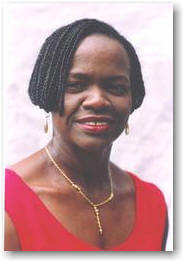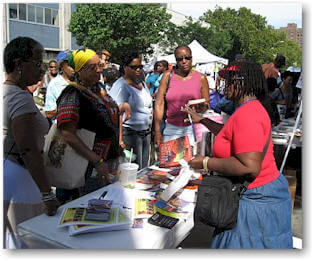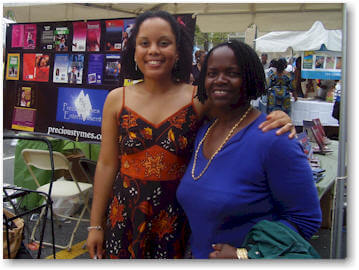A Novelist’s Staying Power: Interview with Gloria Mallette

I first met Gloria Mallette in 2000 at an author event at Zawadi Gifts in Brooklyn. Gloria was giving a reading for her new book, Shades of Jade. I was giving a reading for my first book, Shedding Light From My Journeys. Gloria and I talked after the event and exchanged contact information between ourselves and the other attending authors. Gloria is such an easy going and friendly person that I knew the two of us would remain in contact for years to come. I last saw Gloria at the 2006 Harlem Book Fair where we spoke on the same panel of women authors titled, ’We Drive the Market: What Women Want Now.’ I remember Gloria speaking of feeling a spiritual connection to the process of writing. It was then that I knew Gloria Mallette was person with real depth and I hoped to interview her at some point in time. Gloria is certainly an author of note, having published nine novels, including her latest release, Living, Breathing Lies (June 2007, Gemini Press) and journeyed the path from self publishing to working with mainstream publishers. The following interview I conducted with Gloria Mallette in August 2007, best describes her decade long commitment to the writing life and the creation of African American fiction.
Your career as an author has spanned over a decade. What has the journey been like for you and how has writing changed your life?
True, it has been over a decade since my first book, When We Practice to Deceive was published in 1995, however, my true literary journey began when I self-published Shades of Jade in 2000. That five-year span of silence is an indication of how difficult it was to get publishers to give me a chance. I couldn’t pay them to publish me which is why I had to self-publish in the first place. I forged ahead knowing only what I’d read in a self-publishing manual and prayed that someone would want to read my book. Thank God a lot of readers wanted to read Shades of Jade. Five months after publishing Shades of Jade, I had a two-book contract with Strivers Row, an imprint of Random House.
My initial decision to self-publish changed my life forever. I had long since quit my job before self-publishing to write full-time, so once I started selling, the freedom to write full time was a lot sweeter. Like so many writers, I am totally in my element when I write. I love seeing my characters and storyline develop. I love the freedom of being my own boss. I love the writing life.
You give readers a little bit of everything in your books: mystery, suspense, family drama, secrets, lies and romance. How do you go about crafting your characters and plots from start to finish?
I believe it’s because of my Gemini nature that I can’t be pigeonholed into writing a specific genre, but I would have no other way. My initial premise for a novel usually begins with a germ of an idea. For instance, that I want to write about a man who needs to grow up as in If There Be Pain.
In the first chapter I try to give a sense of who my character is and as I develop that character, that character seems to begin to tell me who he/she is and what he/she is about. By the second or third chapter, that character has completely taken his/her story from me and permits me only to translate his/her story to paper. I never know what my characters will do until they do it. I like that my characters take me where they want to go. I don’t do outlines or synopses because I am totally in the blind as to what is going to happen in any given story. Usually, I have to go back and write a prologue after a book is finished to explain or make sense out of what my characters did throughout the book. It sounds crazy, but I never know what the plot is or how a book will end. Until my characters tell me, I’m like any of my readers waiting to see what will happen next.
Tell us about your latest title, Living, Breathing Lies? What do you hope readers get from the book?
When I started Living, Breathing Lies, I had in mind that I would write a story about a young teacher who takes charge of one of her young students whose mother abandoned her. I had no idea, that Living, Breathing Lies would end up being about lies told and how those lies affected everyone in the liar’s sphere of existence. Nadirah Lewis is the young teacher, who, for seventeen years live under the lie told by her legal guardian, her Aunt Stephanie. Out of guilt for supposedly "crippling" her aunt when she was twelve years old, and also because her aunt is the executrix of her multimillion dollar trust fund, Nadirah lies unhappily in her aunt’s home yearning to be free of the chains that bind her. When Nadirah suspects that her aunt is lying about her condition, Nadirah tells her cousin who helps Nadirah move out of Stephanie’s house into the house of a good friend of hers, Austin Gray. Now fighting for legal custody of one of her young students, Bree Morrison, Nadirah soon learns of the lies told in Austin’s house by his soon to be ex-wife and the lies surrounding Bree’s near fatal dose of poison.
Living, Breathing Lies has a six degrees of separation feel because all of the characters are linked by a lie. This book truly epitomizes, ’breathe a lie, live a lie.’ I hope readers will see for themselves how the telling of a lie can alter the course of one’s life and not for the better, and as well, in the end made matters a whole lot worse than what the truth could ever be.

Mallette (red rhirt) speaks to fans and Harlem Book
Fair 2007
You are the author of nine national bestselling novels: When We Practice to Deceive (Holloway House, 1995), Shades of Jade (Gemini Press, 2000), which was re-released through Random House 2001, Weeping Willows Dance (Gemini Press, 2001), Promises to Keep (Strivers Row/Random House 2002), The Honey Well (Dafina Books/Kensington 2003), Distant Lover (Dafina Books/Kensington 2004), What’s Done in the Dark (Dafina Books/Kensington Jan. 2006), If There Be Pain (Dafina Books/Kensington, Nov. 2006), and your most recent, Living, Breathing, Lies (Gemini Press, June 2007). How has the publishing industry changed since you first entered in 1995?
I almost want to laugh here, but my laugh would be sad. I had been trying to get published since 1989. And actually, I wrote my very first manuscript in 1973 (yes, I was just a baby). No publisher was interested. I was told time and again that my stories were interesting but that there was no "market" for my work. Meaning that we, African Americans, didn’t read.
I finally received a commitment from Holloway House in 1994 for my little mass market paperback of When We Practice to Deceive after several publishing houses in New York turned it down. Other than the books published by Holloway House a.k.a. the House of Donald Goines and Iceberg Slim, and the noteworthy works of authors like James Baldwin, Richard Wright, Ernest Gaines, Zora Neale Hurston, Toni Morrison, etc., it was difficult to find fiction novels by more contemporary authors, especially novels published by major publishers. Oh, sure, there were a handful of authors out there whose names many of us didn’t know, but in the eighties and early nineties, the publishing houses weren’t putting out any welcome mats for the African American man or woman who dreamed of being an author.
I believe the tide turned immensely for African American authors in 2000. Yes, Terri McMillan opened doors for us with her titles, especially Waiting to Exhale, and as well, a number of other authors like Walter Mosley were out there, but in 2000 when an avalanche of authors leaped onto the literary scene with their self-published titles which were outselling the mainstream published titles, the major publishers had to sit up and take notice. Years 2000 and 2001 saw the forming of African American imprints of larger companies to gather up all those money-making self-published titles, and as well to pull in all those authors who had been trying for years to break down the walls publishers had built up to keep us from telling our tales. Seven years later, there are more African American authors, 100-fold, in print today than at any given time in our history. The problem is, ten / twenty years ago, it was the literary author who had a chance at getting published. Today, it is the literary author who is being rejected today for the contemporary author of urban and/or erotic tales. In 1995, I never would have imagined not only the number, but the African American titles themselves that grace the shelves of chain stores and black book stores across the country today.
Each of your titles has a related poem written by you, with the same title. Have you considered writing and publishing a volume of poetry?
Once, fleetingly, I considered writing a book of poetry, but quickly realized that I only felt poetic upon the completion of a novel. It seems the poem for me summarizes the message of the novel. Go figure.
What has the writing life been like for you as a full-time writer?
Writing full time now since 1997 for me has been wonderful. Usually, I’m very disciplined and begin my work day before nine a.m. and at times end my day well after six p.m., especially now that I am again self-publishing. I tell myself that I have to go to work. I’ve always had an office in my home so I had a place to actually go. It certainly beats commuting.
Do you write everyday?
When I am working on a book, yes, I do write everyday.
If so, what schedule do you have set up for yourself when you are working on a project?
I am best creatively in the morning. So it is important that I begin my day early and have no interruptions. I love when my son is in school.
In your early career you made the decision to self publish Shades of Jade, and then you were picked up by Random House and later Dafina Books/Kensington and then Strivers Row/Random House. Why did you decide to self publishing with the release of Living, Breathing, Lies?
I had no choice but to return to the self-publishing arena. With my third contract offer, despite the fact that the new editor at Kensington had made the offer upon receiving my option book, Living, Breathing Lies, she did an about-face and said that I needed to write something more commercial—meaning she wanted me to add more sex and high drama to my tales, and not write the "same old family drama." I asked her, "Didn’t we already have enough urban and erotica out there?" She said, "No." She asked me to present her with a proposal for a more "commercial" book and I did when I was uncomfortable doing so. The editor liked it and wanted to go with that proposal and not Living, Breathing Lies. I asked her what was supposed to happen with Living, Breathing Lies, and was told that I couldn’t take it anywhere else, nor could I self-publish it. That wasn’t an option for me. I told my agent that I wasn’t signing another contract with Kensington, especially since I’d never had a tour or a publicist or a promotion budget. The new editor got the message and here I am, again, a self-published author. All the wiser.
The publishing industry tends to lump all current Black novelists in the category of urban, hip hop or street fiction with the exception of a handful of Black authors who are considered literary. What do you think of those labels and how would you categorize your own work?
Many of us saw this coming and tried to stand out, but when the publishers promote only those books that carry urban or hip hop or street titles, and that’s all the reading public and media sees in book stores and in interview forums, then who’s surprised by the urban label placed on the heads of the majority of African Americans authors? Let’s face it, since 2001, millions of dollars have filled the coffers of the major publishing houses because of these titles.
Do I like this label? No. Not when there are other authors out here, including myself, seeking recognition for their work. I wouldn’t say that I was especially literary, but I’m certainly not hip hop, street, or urban. I have readers who like my work, and have been told by reviewers and editors that I’m a great storyteller, but that’s not what the publishers today are looking for. I write about issues and realism. I am a storyteller, who would one day like to be remembered as a novelist of quality.
Who are some of your favorite authors both past and present?
Interestingly, I loved reading James Baldwin, Richard Wright, Toni Morrison and Ernest Gaines. Since I started writing, regretfully, I found myself not reading any of my contemporaries because I never had much time.
What advice would you offer writers itching to write their first novel and have the staying power you have had?
First I’d tell anyone itching to write their first novel to get to work. Be disciplined. Do their research. Stay focused, and when no one wants to publish you, publish yourself. Let no one tell you that you can’t achieve your dreams.
Are there any mistakes that you made along the way from which you would like to impart wisdom?
I guess the biggest mistake I made along the way was thinking that my publisher would do more to promote my book. After the first two books, I should have done more research to find out how to better promote myself and as well how to better use the money I had to market my titles.
What is next for Gloria Mallette and Gemini Press?
I am now back to working on my next book, SASSY. What it’s about, I can’t say. Until my characters take me on their journey, I don’t know a thing.

Authors, DuEwa M. Frazier & Gloria Mallette

